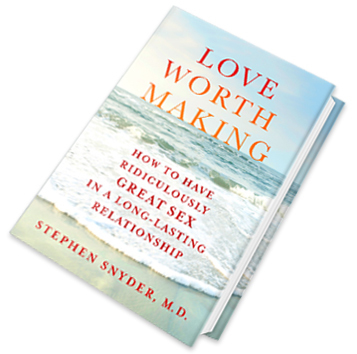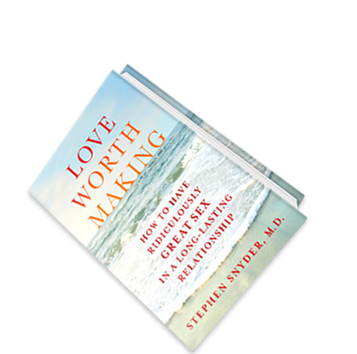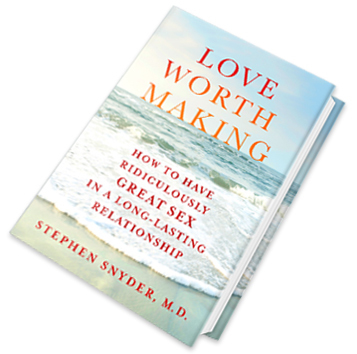The One Sex Tip You Need for a Long-Lasting Relationship
Sex tips these days tend to be long on technique, but short on feelings. Maybe that explains why so few couples in my sex therapy practice seem to come in with any idea what good sex is supposed to be all about.
In this article, I’ll introduce you to my new self-help sex book, which is all about feelings.
But first, let me tell you a story . . .
Your Wife Is Not a Lawnmower
“Tell me about foreplay,” I say to the next couple in my office. “What kind of foreplay do the two of you enjoy the most?”
“Well, we kiss,” she says. “Then I touch him, and he touches me.”
She’s obviously speaking in some kind of secret code here. But you get the picture, right? She strokes his penis, and then he does something to her vulva with his hands.
Is this a good idea?
Well, that depends. If this couple is riding a wave of ecstasy fueled by erotic touch, then sure. But in that case, chances are they wouldn’t be sitting in my office. More likely, they’re just trying to get the job done—to get him hard and her wet, so they can have sex.
How many couples do it this way when they first fall in love? Not many. When passion is high, no one needs friction to get excited. Hardness and wetness just happen as effortlessly as the blooming of a flower.
That’s the way it’s supposed to go. The sexual self saying yes, in the only language it knows. Trying to convert a “no” to a “yes” by friction alone is like trying to convince a child he likes broccoli.
Forget it. It’s not going to work. Friction may get you sex, but never good sex.
As I sit with this couple, I can’t help recalling a scene from my suburban childhood—watching one of the neighborhood dads try to start up his gas lawn mower. You had to pull the cord just right for the engine to start, and this took practice and skill.
I live in Manhattan now where we don’t have lawns. But the image is still stuck in my head—the mower, the cord, and the look of frustration on the face of the guy hoping to start the thing up.
I wonder whether this couple is old enough to have ever seen a gas mower.
“Look,” I say to him. “Your wife is not a lawnmower. It’s not just a question of pulling the cord right.”
They both laugh.
“But how do I get her wet?” He asks.
“Simple. You don’t.” He looks at me with curiosity.
“It’s not your job to get her wet,” I say. “Just enjoy your own excitement, and let her enjoy hers.”
“That doesn’t sound very romantic.”
“It’s actually much more romantic, if you do it right. And something even more important.”
“What’s that?” he asks.
“It’s more erotic.”
————
Sex Tips That Really Make a Difference
We’re the most sexually over-exposed society in human history. Pornography is everywhere. We know the names for sex acts our grandparents never knew existed. And even kids in middle school know that if an erection lasts more than four hours you should call your doctor.
But are couples today any more satisfied in bed?
I doubt it. One study from the Kinsey Institute found that nearly a quarter of adult American women in heterosexual relationships were markedly distressed about their sex lives.
All the sex tips out there don’t seem to be healing us where it counts. Maybe that’s because they’re all about technique, and rarely about feelings.
Emotions are far and away the most important part of sex. But few couples give much thought to their emotions while making love.
As a sex therapist—someone who gives sex tips and relationship advice for a living—I’ve searched for a long time for a book to recommend to my patients that would help them learn about erotic feelings. Finally, after years of fruitless searching, I finally decided to write it myself.

The book launched the day before Valentine’s Day 2018: Love Worth Making: How to Have Ridiculously Great Sex in a Long-Lasting Relationship.
It’s in many ways a contrarian book. Contrary to most collections of sex tips today, it contains very little about sex technique, sexual science, or sexual novelties like three-somes and kink. Instead, the book focuses like a laser beam on sexual emotions: what you actually feel, or don’t, when you’re having sex.
————
The Best Sex Tip of All
Masters and Johnson spent decades studying sexual response, but their observations were limited to the physical body: heart rate, muscle tone, lubrication, and hardness.
Hardness and wetness will only get you so far. You can be perfectly hard or wet, but still be having very boring sex.
Here’s what I tell patients in my office to look for, as signs that you’re genuinely emotionally aroused—
(Passages in italics below are from Chapter 1 of Love Worth Making).
1. You lose a fair number of IQ points. “If someone gave you an IQ test during peak arousal, you wouldn’t do too well on it. The tester might have a hard time getting you to pay attention to the questions. Good sex definitely makes you dumber. And great sex can make you downright stupid. When you’re aroused, sex grabs your attention. You stop thinking about bills, worries, responsibilities—your entire portfolio of ordinary concerns. Your time sense may get a little messed up. (Sexually aroused people tend to arrive late to meetings).”
2. You become somewhat more childish. “Sexual excitement puts you into a more primitive and selfish state of mind. It makes you less patient, less forgiving. You don’t tolerate frustration very well. You become somewhat immature. (OK, sometimes a lot immature!) If the phone rings during lovemaking, you don’t care who’s calling, or what they want. You may feel very close to your partner, but it’s a selfish kind of closeness. You’re not really interested in listening to the details of how their day went. You just want them to give you their complete attention, and to tell you how wonderful you are.”
3. You feel absolutely wonderful about yourself. “Arousal feels special. Validating. Good sex makes us feel good about ourselves. That’s how we know it’s good sex. With good lovemaking, we have a feeling of “Yes, that’s me. Here I am. You found me.” We feel in touch with our deepest, most authentic selves. It’s a grateful feeling. ‘Yes, you found me. The me of me. Thank you for finding me. Thank you for bringing me home to where I really live.’”
Pay attention to those three elements, cultivate experiences with your partner that permit you to experience them, and you’ll be on your way to much better sex.
That’s the best sex tip I have for you today.


Order your copy today!

Coming Soon . . .
Stay tuned for future posts in the weeks ahead on how understanding sexual feelings can help or heal your relationship. Here are some previews:
Sex Advice for Women,
And the Men Who Love Them
We’ll review new research from my colleagues Marta Meana and Evan Fertel at the University of Nevada, Las Vegas on what’s called “Erotic Self-Focus” (Chapter 7 in the book)—and how to make it work for you!
Sex Advice for Men,
And for Women Who Want More From Them
We’ll discuss the most common reasons men go missing in bed. Some of them might surprise you. It’s all in Chapter 11.
Sex Advice for Long-Term Committed Couples
Sooner or later, desire takes a hit in most long-term relationships. Most sex advice focuses on “re-igniting the spark” by re-introducing some variety of novelty and adventure. But novelty and adventure tend to wear thin after awhile. In Chapter 15, I’ll show you a better way.
Adapted from LOVE WORTH MAKING by Stephen Snyder, M.D. Copyright © 2018 by the author and reprinted with permission of St. Martin’s Press, LLC.

Order your copy today!

The post The One Sex Tip You Need for a Long-Lasting Relationship appeared first on Stephen Snyder MD.








